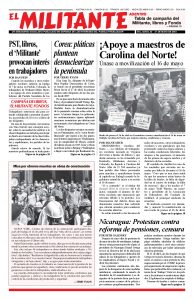More than 100 supporters of women’s right to choose abortion gathered at the state Capitol in Des Moines for an “Iowa Fights Back rally” May 4. They were protesting Gov. Kim Reynolds signing into law that day a so-called fetal heartbeat bill. The law would ban abortions so early in the pregnancy — at six weeks — that a woman might not even realize she was pregnant.
The fight for reproductive rights is “all of our fight,” Suzanna de Baca, president of Planned Parenthood of the Heartland, told the rally, “and it’s on all of us to push against these attacks on our lives, our bodies … our rights.”
The law requires doctors to give all women an ultrasound before performing an abortion. If any pulsation is detected, then an abortion cannot be performed. Any doctor who does perform the medical procedure could see their license revoked or charges filed by local prosecutors, though no penalties are set by the bill.
“The law is bad. Every woman has the right to make her own decision. Very young women get pregnant accidentally and now they won’t have the option,” Ramona Chavez, a certified nursing assistant in Marshalltown, Iowa, told the Militant. “Personally, I don’t believe in abortion for myself, but I think every woman has the right to decide.”
The American Civil Liberties Union of Iowa and Planned Parenthood announced they will file a lawsuit challenging the law, which they are confident will be struck down.
This “would be the most restrictive abortion law in the country,” Iowa ACLU Executive Director Mark Stringer told the press. “It is clear that the goal of this legislation is to overturn Roe v. Wade, ultimately banning all abortions.” Proponents of the bill in the legislature readily agreed that the bill was promoted so it could be challenged in hopes it would allow a revamped Supreme Court to outlaw abortion.
If this bill goes into effect, it could close the residency program in obstetrics and gynecology at the University of Iowa, the only such program in Iowa.
Similar abortion bans in Arkansas and North Dakota were ruled unconstitutional in 2013. Other “heartbeat” law proposals are being pushed in Missouri, Mississippi, New York, Ohio, Oklahoma and Tennessee.
Attempts to restrict abortion rights have been facilitated by the reasoning in the 1973 Roe v. Wade ruling itself. The Supreme Court didn’t base its decision on a woman’s right “to equal protection of the laws” guaranteed by the 14th Amendment to the U.S. Constitution, but on “medical criteria” instead.
Enemies of women’s rights use the fact the court allowed state governments to ban most abortions after “viability,” described in the ruling as the point at which a fetus is “potentially able to live outside the mother’s womb.” Medical advances inevitably make this earlier and earlier in pregnancy.

